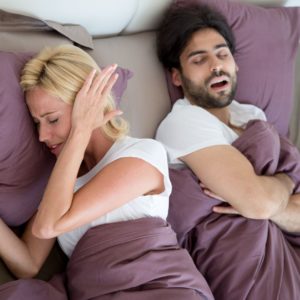
The question is: Is that snoring sleep apnea? Or it is just, well, snoring?
Numbers
According to the American Academy of Otolaryngology, 45 percent of the U.S. population snores occasionally, and 25 percent of adults snore chronically. To take it one step further, an estimated 18 million Americans suffer from obstructive sleep apnea.
OK, so what’s the difference?
People often come see Dr. Volpi at eos Sleep and think that snoring and sleep apnea are interchangeable. Not true. Yes, all untreated people with obstructive sleep apnea snore, but only some people who snore have sleep apnea.
Snoring is more like a musical instrument. Don’t say that to your partner who hears your snoring symphony, however! Like a vibration made by two pursed lips and sent through brass piping to make the sound of a trumpet, snoring is also caused by vibration. The vibration in casual snoring comes in the back of the throat, as sagging tissues get in the way of the airflow. They don’t block it, but they impede it, and the interference is snoring.
Different things can make you snore:
- Sinus infections or colds
- Allergies
- Lots of alcohol
- A deviated septum
- Poor muscle tone
- Throat and airway obstructions
Sleep apnea is like having someone stick a cork in your throat dozens of times every night. Unlike the casual throat airflow interference with snoring, with sleep apnea the person’s airflow is blocked. This sends an S.O.S. to the brain, “Uh, hi, we’re not getting any oxygen back here, so could you do something?” The brain responds by violently waking the person to open the airway and restore airflow. In most cases, the person has no recollection of being awoken, but this happens all through the night. The person will pay for the interrupted sleep the next day with fatigue, difficulty concentrating, higher blood pressure, and other issues.
But you may need an expert like Dr. Volpi at eos Sleep to diagnose whether your snoring is just an annoying symphony to your partner or whether you have sleep apnea. A sleep study is probably the first step.
If you think you’re suffering from chronic snoring or obstructive sleep apnea, you need to give us a call at eos Sleep, (212) 873-6036.
